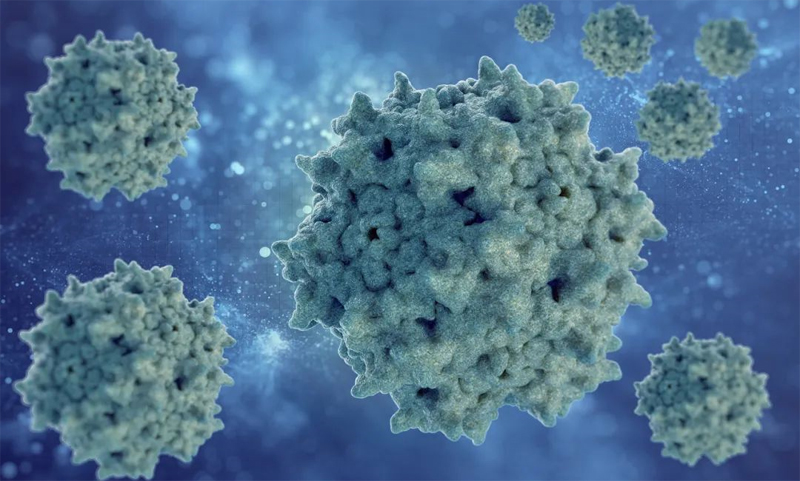AB-836, a next-generation oral hepatitis B virus (HBV) capsid inhibitor (class II capsid inhibitor) that Arbutus Biopharma is developing for the treatment of chronic hepatitis B, recently announced that due to safety concerns with the drug Decided to terminate the clinical development of the drug.
At the previous 2022 European Society of Liver Disease Annual Meeting (EASL2022), the researchers announced the results of the ongoing phase 1a/1b clinical trial of AB-836. The study evaluated the safety, PK, and antiviral activity of AB-836 in healthy volunteers (Parts 1 and 2) and subjects with chronic hepatitis B (Part 3).
Healthy volunteers (N = 47) had a mean age of 29 years, a mean BMI of 24.7 kg/m2, all were male, and 57% were white. Safety data showed that AB-836 was well tolerated in healthy volunteers. No deaths or serious adverse events (AEs) were observed, and 1 healthy subject receiving 50 mg daily discontinued treatment on day 13 due to anxiety-related adverse events (AEs). All but 3 AEs were mild (grade 2 headache, agitation, and bronchitis); only 1 was assessed to be related to AB-836 (grade 1 rash).
Data from Part 3 of the trial showed that 100mg and 200mg doses of AB-836 provided potent inhibition of HBV replication with mean HBV DNA reductions of 3.04 and 3.55 log10 IU/mL at day 28, respectively.
From a safety perspective, no deaths or serious adverse events were observed. Two HBeAg+ patients in the 100 mg dose cohort experienced transient grade 3 ALT elevations that resolved with continued dosing and were not considered treatment-emergent adverse events (TEAEs).
Two patients in the 200 mg cohort developed grade 3 and 4 ALT elevations on the last day of dosing (day 28), which returned to baseline during follow-up, reported as TEAEs. Grade 3 and 4 ALT elevations in the 200 mg cohort were accompanied by elevations in serum IP-10, a hepatotoxic cytokine potentially associated with previously described capsid inhibitors.
All patients with elevated ALT were asymptomatic and had no bilirubin changes or met criteria for drug-induced liver injury (DILI). No other clinically significant laboratory abnormalities, electrocardiographic or vital sign changes were observed.
Although the safety signals observed in the 200 mg cohort of patients with chronic hepatitis B were resolved during follow-up and were not related to clinical symptoms, an increase in serum IP-10 associated with potential hepatotoxicity was observed in this cohort, a cytokine that is still exploratory Research stage, no clear results.
Combining the five biomarkers we observed in previous cases of capsid inhibitor-related hepatotoxicity, for patient safety, it was decided to conduct an additional Phase 1 trial in healthy volunteers to determine safety.
Arbutus Biopharma said recently that in this additional group of healthy volunteers, two subjects taking AB-836 developed low-level ALT elevations more than 20 days after taking AB-836, forcing the company to discontinue dosing. Based on these additional safety findings, the company ultimately decided to discontinue clinical development of AB-836.
Looking back on Arbutus Biopharma’s initiatives in the field of new chronic hepatitis B drug research and development in recent years, it can be described as a model of repeated defeats and battles.
In 2017, because the clinical performance of the RNAi therapy drug ARB-1740 for the treatment of chronic hepatitis B was not as good as that of ARB-1467 in the same period, the company announced the termination of the clinical research work of ARB-1740, and ARB-1740 was fixed in Phase II clinical trials.
In 2018, the clinical development of the RNAi therapy drug ARB-1467 for the treatment of chronic hepatitis B was terminated due to its unsatisfactory clinical performance. The company turned to focus on the development of the next-generation RNAi therapy drug AB-729. Phase II clinical trials.
In 2018, the first viral core protein/capsid inhibitor drug AB-423 developed by the company was terminated from clinical development, and AB-423 was fixed in Phase I clinical trials.
In 2019, the company was forced to decide to terminate the clinical development of AB-506 due to the outbreak of acute hepatitis after the second viral core protein/capsid inhibitor drug AB-506 was administered to 2 subjects in Phase 1 clinical trials. AB-506 is in Phase I clinical trials.
In 2020, the HBV RNA destabilizer drug AB-452 developed by Arbutus Biopharma for the treatment of chronic hepatitis B was delayed due to safety issues in preclinical research. In 2020, the company finally decided to terminate the clinical development of AB-452 based on the problems found in clinical research. Ultimately, the drug was approved for Phase I clinical trials.
This year, also due to safety issues, Arbutus Biopharma decided to terminate the clinical development of the viral core protein/capsid inhibitor drug AB-836, which is locked in Phase I clinical trials.









